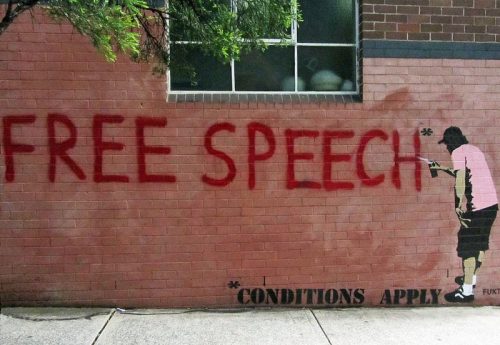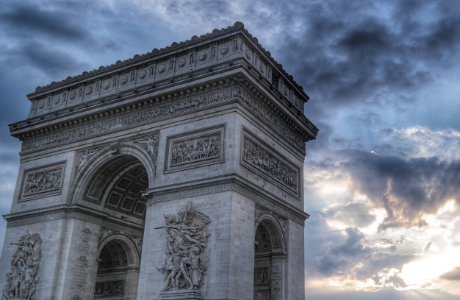We’ve heard a lot about free speech over the past few years. The restrictions and lockdowns during the pandemic heightened people’s concerns. Those whose narrative is conservative or conspiratorial, especially from a futurist reading of Bible prophecy, are particularly susceptible.
People have protested on the streets the world over against restrictions and mandates perceived to limit freedom. One Christian organisation asked, “What do we do as we see increased attacks on our freedom of speech and association?” A plea for donations followed the question because inciting fear is a great way to get people to give money to support a cause, even if that cause doesn’t exist. I blogged on that last week.
So, let’s define and explore freedom of speech and what the Bible has to say.
Defining Freedom of Speech
Webster’s dictionary defines freedom of speech as “the right to express facts and opinions subject only to reasonable limitations.” This right is enshrined in the Constitution and guaranteed by the 1st and 14th amendments in America.
In Australia, freedom of speech is not a protected right except for political discourse, which is safeguarded from criminal prosecution at common law. However, Australia is a signatory to the Universal Declaration of Human Rights (1948), which states that: “Everyone has the right to freedom of opinion and expression; this right includes freedom to hold opinions without interference and to seek, receive and impart information and ideas through any media and regardless of frontiers.”
Australian Law
Freedom of speech was limited in Australia by the Racial Discrimination Act of 1975. Just over 20 years ago, Section 18C was added to the Act stating, “It is unlawful for a person to do an act, otherwise than in private, if:
(a) the act is reasonably likely, in all the circumstances, to offend, insult, humiliate or intimidate another person or a group of people; and
(b) the act is done because of the race, colour or national or ethnic origin of the other person or of some or all of the people in the group.”
Some have tried, unsuccessfully, to have 18C removed from the Act, but why would they? Who would want to “offend, insult, humiliate or intimidate another person or a group of people” based on “race, colour or national or ethnic origin?” Moreover, if they did, why should they get away with it?
It should also be remembered that 18C is modified by Section 18D, where much free speech is protected. The original Racial Discrimination Act was (and still is) primarily concerned with situations in which racism produces a material disadvantage for someone.
Freedom with Responsibility
So, in Australian law (as well as American), we see freedom of speech protected within certain boundaries, reflecting the Bible’s view on free speech. In the beginning, God gave human beings free will but then set parameters: “You are free to eat from any tree in the garden; but …” (Genesis 1:17). There are limits to your freedom, and there are consequences if you go beyond those limits. In fact, it’s impossible to define or experience true freedom without clear boundaries.
The publishers of Charlie Hebdo Magazine would have been wise to heed that advice. While I disagree with the actions of the terrorists who killed twelve people at Charlie Hebdo in 2015 if you’re going to move into territory that inflames religious extremists, there are most likely consequences. Free speech comes with a great responsibility not to offend unnecessarily.
Freedom with Wisdom
Consider Dutch far-right politician Geert Wilders’ Prophet Muhammad cartoon competition which was cancelled in August 2018. Drawing the Prophet Muhammad is seen as blasphemous in parts of the Islamic world and is deeply offensive to some Muslims, so why would someone use their freedom of speech to offend deliberately? It reeks of political opportunism.
The same could be said of Chelsea Manning, who, it should be noted, was convicted of six breaches of the Espionage Act. While President Obama commuted her sentence, the punishment remains on her record. Ms Manning is not just some whistle-blower; she was convicted of espionage and given a lengthy prison sentence. The Australian Government was fully entitled to deny Chelsea Manning a visa and keep her out of the country. Freedom of speech must be modified by wisdom and common sense.
Biblical Boundaries for Free Speech
The Bible limits free speech. As a follower of Jesus, you are NOT free to say anything you like. Neither are you entitled to express whatever is on your mind. Consider Proverbs 29:11, “A fool utters all his mind, but a wise person holds it back.”
Contemplate Colossians 4:6, “Let your speech always be gracious, seasoned with salt, so that you may know how to answer everyone.” “Seasoned with salt” is a metaphor that communicates “the adding of value” to others by our words rather than offending, sniping and criticising. Discretion limits freedom of speech.
We are also not free to gossip (Proverbs 25:9). Well, we are, but remember those consequences? The Bible also discourages swearing, dishonesty, lying, and insulting. Christians must speak the truth in love and use their words to build others up rather than tearing them down. But that doesn’t mean we can’t respectfully present views that differ from those held by others.
A lost art?
Society needs to learn the art of respectful and robust debate once again rather than trying to win arguments by making personal slurs or trying to silence our opponent.
The Christian church flourishes when it takes its eyes off itself, its rights and its demands and uses its freedom of speech to “Speak up for those who cannot speak for themselves, for the rights of all who are destitute. Speak up and judge fairly; defend the rights of the poor and needy.” (Proverbs 31:8-9 It’s that kind of free speech that others sit up and listen to.
IMAGE CREDITS
Main image: “Free Speech” by Newtown Graffiti




